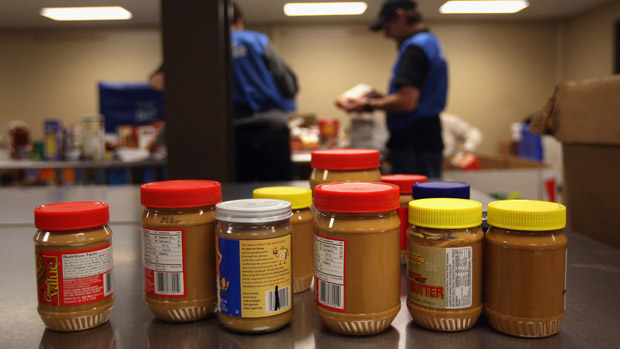Early exposure to peanuts 'can help prevent allergy'
'Compelling' results contradict earlier medical advice and may force doctors to issue new guidelines

A free daily email with the biggest news stories of the day – and the best features from TheWeek.com
You are now subscribed
Your newsletter sign-up was successful
Babies who eat food containing peanuts are significantly less likely to develop an allergy to them, a groundbreaking new study has revealed.
The results are "so compelling and the problem of the increasing prevalence of peanut allergy so alarming that new guidelines should be forthcoming very soon", said the New England Journal of Medicine.
In the largest study of its kind, researchers at King's College London tested babies at risk of developing allergies over a period of four years. Half of the children were regularly exposed to foods containing peanuts, while the rest received none. By the time the children were five, only one per cent of those who had been given peanut protein developed an allergy, compared with 17.5 per cent of the rest.
The Week
Escape your echo chamber. Get the facts behind the news, plus analysis from multiple perspectives.

Sign up for The Week's Free Newsletters
From our morning news briefing to a weekly Good News Newsletter, get the best of The Week delivered directly to your inbox.
From our morning news briefing to a weekly Good News Newsletter, get the best of The Week delivered directly to your inbox.
"[It was] exciting for us to realise for the first time that, in allergy, we can actually truly prevent the development of a disease," lead researcher Professor Gideon Lack told the BBC. "It represents a real shift in culture."
Previously, parents were advised not to expose at-risk children to any peanut products, but Professor Lack argues the study shows that not only was this advice wrong, it actually contributed to a rise in allergies.
"We realise this is very much contrary to previous advice, but it is essential that we direct our attention to this group of infants and stem this growing epidemic of peanut allergy," he said.
Allergy levels in the western world are soaring, with one in 50 schoolchildren in the UK suffering from a peanut allergy, which can be fatal. Scientists are now calling for new public health guidelines to be introduced.
A free daily email with the biggest news stories of the day – and the best features from TheWeek.com
However, parents with at-risk children have been warned not to experiment with peanut exposure without first seeking medical advice. "Don't try this at home," said leading allergy specialist Dr Andrew Clark.
The study leaves a number of questions unanswered, including whether allergy prevention will continue if children stop eating peanuts and whether this method could work with other food allergies.
"Exposure treatment like this still needs more testing," says Science Now magazine. "But for prevention of a life-threatening allergy, the landscape has changed."
-
 The ‘ravenous’ demand for Cornish minerals
The ‘ravenous’ demand for Cornish mineralsUnder the Radar Growing need for critical minerals to power tech has intensified ‘appetite’ for lithium, which could be a ‘huge boon’ for local economy
-
 Why are election experts taking Trump’s midterm threats seriously?
Why are election experts taking Trump’s midterm threats seriously?IN THE SPOTLIGHT As the president muses about polling place deployments and a centralized electoral system aimed at one-party control, lawmakers are taking this administration at its word
-
 ‘Restaurateurs have become millionaires’
‘Restaurateurs have become millionaires’Instant Opinion Opinion, comment and editorials of the day
-
 Home Office worker accused of spiking mistress’s drink with abortion drug
Home Office worker accused of spiking mistress’s drink with abortion drugSpeed Read Darren Burke had failed to convince his girlfriend to terminate pregnancy
-
 In hock to Moscow: exploring Germany’s woeful energy policy
In hock to Moscow: exploring Germany’s woeful energy policySpeed Read Don’t expect Berlin to wean itself off Russian gas any time soon
-
 Were Covid restrictions dropped too soon?
Were Covid restrictions dropped too soon?Speed Read ‘Living with Covid’ is already proving problematic – just look at the travel chaos this week
-
 Inclusive Britain: a new strategy for tackling racism in the UK
Inclusive Britain: a new strategy for tackling racism in the UKSpeed Read Government has revealed action plan setting out 74 steps that ministers will take
-
 Sandy Hook families vs. Remington: a small victory over the gunmakers
Sandy Hook families vs. Remington: a small victory over the gunmakersSpeed Read Last week the families settled a lawsuit for $73m against the manufacturer
-
 Farmers vs. walkers: the battle over ‘Britain’s green and pleasant land’
Farmers vs. walkers: the battle over ‘Britain’s green and pleasant land’Speed Read Updated Countryside Code tells farmers: ‘be nice, say hello, share the space’
-
 Motherhood: why are we putting it off?
Motherhood: why are we putting it off?Speed Read Stats show around 50% of women in England and Wales now don’t have children by 30
-
 Anti-Semitism in America: a case of double standards?
Anti-Semitism in America: a case of double standards?Speed Read Officials were strikingly reluctant to link Texas synagogue attack to anti-Semitism